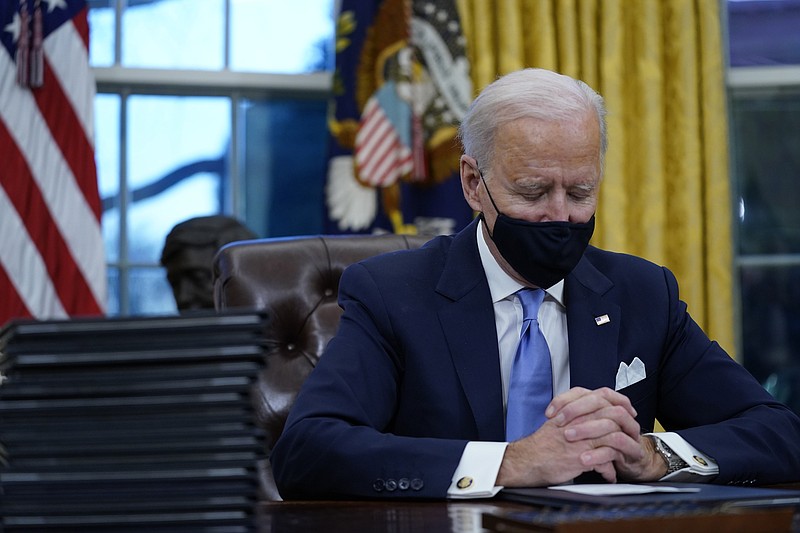NEW YORK (AP) - President Joe Biden has put his team to work reviewing dozens of actions taken by former President Donald Trump, aiming to reverse orders he said harm the environment or endanger public health.
For the energy and auto industries, the impact could be far-reaching.
Biden aims to reduce harmful emissions from cars, trucks and SUVs. Oil and gas operations are being scrutinized as well - from how companies extract resources from the ground to the safety of pipelines that distribute the fuels. The new president aims to transition the country to 100 percent renewable energy for electricity generation by 2035 and net-zero emissions in the overall economy by 2050.
Many experts agreed Biden's actions could help the nation achieve ambitious climate goals and further enhance the renewable energy sector, driving job growth. Others said they worry more that stricter regulations could hurt companies struggling to recover from the pandemic, which decimated demand for fuel.
Here is look at some energy issues Biden plans to tackle:
FUEL ECONOMY
The new administration intends to undo one of Trump's biggest changes: His gutting of Obama-era fuel economy and greenhouse gas emissions standards for automobiles through 2025. However, the regulatory slog could take a couple of years unless Trump's rollbacks are thrown out by the courts.
David Friedman, a former acting administrator of the National Highway Traffic Safety Administration, one of the agencies that sets such auto standards, said he thinks it will take until the 2023 model year for stricter standards from Biden to take effect. The Trump administration cut Obama-era standards for model years 2021-25 from 4.7 percent annual fuel efficiency gains to 1.5 percent, weakening one of the nation's biggest efforts to fight climate change. Trump contended the changes would make cars more affordable and safer. Both points were disputed by environmental groups.
The rollback was largely supported by the auto industry, though Ford, BMW, Volkswagen, Honda and Volvo backed California for what amounted to 3.7 percent annual fuel efficiency increases. Many in the industry think the agreement with California is where bargaining will begin with the Biden administration.
Automakers have long maintained they would have trouble meeting Obama-era standards if they aren't rolled back. The industry has said it supports increased standards, but because people are buying less-efficient SUVs and trucks, it would have trouble reaching the Obama numbers.
During the 2019 model year, 11 of 14 major automakers had to rely on regulatory credits because they didn't meet standards, according to EPA figures. Gas mileage declined and pollution went up in 2019 for the first time in five years.
FEDERAL DRILLING BANS
Biden directed the Interior Department to halt all leasing for oil and natural gas exploration in the Arctic National Wildlife Refuge. He also ordered a 60-day moratorium on new oil and gas leasing and drilling permits on federal land, as part of a review of Trump-era rules designed to accelerate such activity.
Some energy analysts suggested the moratorium could be just the first step in a much larger agenda to end drilling on federal land.
"Today's initial suspension could give way to emergency suspension that lasts much longer, essentially ending lease sales," said Kevin Book, managing director of Clearview Energy Partners. Biden could, for example, declare a climate emergency, rewrite land management rules, slow permitting or make leases less financially attractive.
In the waning months of the Trump administration, companies began stockpiling permits to drill on federal land.
Oil industry leaders said restricting development on federal land might just lead the U.S. to import more oil.
PIPELINES
Among his first executive orders, Biden revoked the permit for the Keystone XL pipeline, the 1,700-mile pipeline that was to carry oil from Alberta, Canada, to the Texas Gulf Coast. Keystone XL began shutting down construction, and the company said it would eliminate more than 1,000 jobs in coming weeks.
The pipeline had been a symbol of struggle between the goals of preserving jobs and curtailing global warming. Trump had presided over an expansion of the nation's oil and gas pipeline network. However, legal setbacks chipped away at his progress.
Environmentalists and Native American tribes had opposed the pipeline, arguing new infrastructure for fossil fuels would worsen climate change.
"We should invest in infrastructure that helps us build a cleaner and healthier America, not infrastructure that ties us to the dirty energy sources of the past," said Matt Casale, of U.S. PIRG, a federation of nonprofits.
The American Petroleum Institute assailed Biden's actions on Keystone as a step backwards that would hurt union workers.
"Pipelines are the safest, most environmentally friendly way to transport energy, and the economy cannot recover at full speed unless we deliver reliable energy from where it is to where it is needed," said Mike Sommers, the institute's CEO.

